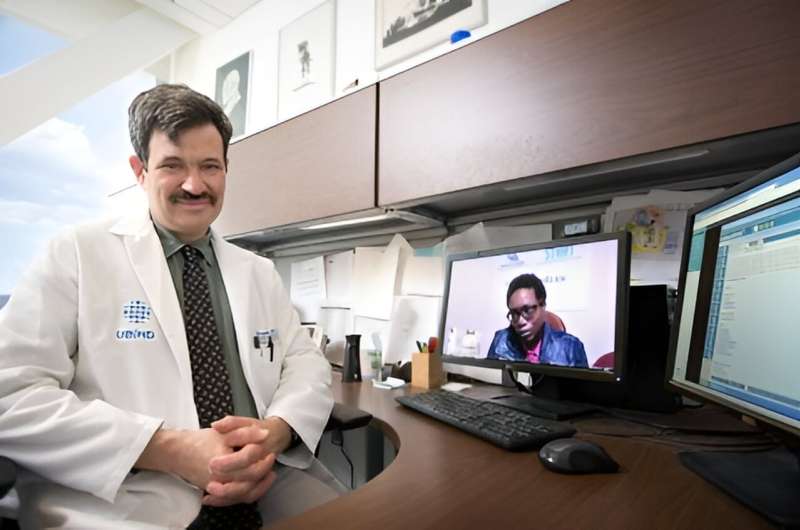This article has been reviewed according to Science X's editorial process and policies. Editors have highlighted the following attributes while ensuring the content's credibility:
fact-checked
trusted source
proofread
Telemedicine treatment for HCV in people with opioid use disorder more than twice as successful as offsite referral

Telemedicine is widely perceived as an important tool for potentially improving health care access for the underserved. However, few randomized controlled trials have been conducted to determine its effectiveness in treating these populations.
Individuals with opioid use disorder are a particularly challenging underserved population to treat in conventional health care settings, and they are at highest risk for hepatitis C virus (HCV) infection through needle sharing.
University at Buffalo researchers explored the effectiveness of integrating telemedicine into opioid treatment programs for HCV management, thereby removing the need for offsite referrals.
The goal was to compare onsite facilitated telemedicine to offsite referral to an HCV specialist, the usual care approach in treating HCV in these individuals. In this model, telemedicine encounters are facilitated by a case manager who is also a patient advocate and educator.
Their findings: Not only is telemedicine far more effective in treating and curing this population than usual care, the advantages of being cured resulted in sustainable health and social benefits as well.
The UB researchers will present their findings in Boston on Nov. 13 at The Liver Meeting, the annual meeting of the American Association for the Study of Liver Diseases.
Nearly 91% of telemedicine participants were cured
The study was conducted at 12 opioid treatment programs that dispense methadone in New York State from 2017 to 2022. Researchers enrolled 602 participants with opioid use disorder who had been diagnosed with HCV. Participants received treatment with direct acting antiviral medications for HCV and were followed for two years after being cured to evaluate for reinfection.
The researchers found that 90.7% of those in the telemedicine arm at an opioid treatment program were cured of HCV infection compared to 35.2% of participants who were referred to an offsite specialist. Two-thirds of those in the referral arm never initiated HCV treatment.
During two years of follow-up, there were minimal HCV reinfections in either arm of the study.
"Telemedicine leads to high patient retention in care and cure within this population," says Andrew H. Talal, MD, professor of medicine in the Jacobs School of Medicine and Biomedical Sciences at UB and principal investigator.
The researchers also found that being cured of HCV resulted in subsequent health and well-being improvements for participants, including significant reductions in substance use.
"We observed significant decreases in substance use among all of those who were cured, regardless of which arm of the study they were in," Talal adds. "Patient interviews revealed that being cured of HCV strengthened their self-confidence and enabled them to address other health issues and challenges in their lives."
In many cases, after initiating treatment for opioid use disorder combined with an HCV cure, individuals were able to successfully seek employment, improve their education status and reduce their involvement with the criminal justice system.
Talal says that a key advantage was the innovative approach of integrating telemedicine for HCV treatment into settings where patients receive methadone treatment.
Reducing stigma
He explains that their findings demonstrate a key benefit of telemedicine: It improves health care access for people with opioid use disorder who typically encounter shunning and stigma in conventional health care settings. It also demonstrates how telemedicine can help improve access to different kinds of care.
"Our study demonstrates how telemedicine successfully integrates medical and behavioral treatment," he says. "Our participants viewed the opioid treatment program as a destigmatizing environment to begin with. When participants trust the staff in the program, that trust then extends to the telemedicine provider, especially when they express empathy. These attributes allow for successful HCV treatment and lead to high patient satisfaction through telemedicine."
The results, Talal says, demonstrate that telemedicine should be further investigated as an approach to increase health care access for other underserved populations experiencing other health conditions.
Additional takeaways from the study include that it successfully engaged an underserved population in clinical research and that a complex clinical trial was successfully implemented and completed at sites providing clinical care to people with opioid use disorder.


















